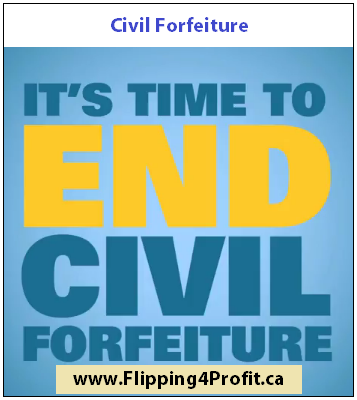Civil Forfeiture: Your property can be seized by Government without it being your fault!
Civil forfeiture: Ontario was the first jurisdiction in Canada to introduce civil forfeiture and 8 out of 10 provinces have such programs today. Professional real estate investors must learn this and become aware of this law. Various provisions of Canadian federal and provincial law permit Canadian Courts to order that a citizen be deprived of what may generally be referred to as either offence related property or proceeds of crime. What you do not know cost you big time, that's why every Canadian real estate investors must learn form Canadian real estate experts.
In eight provinces in Canada, the government can take away your home, your car and your cash, without ever charging you with a crime. Most people are not aware of how easily the government can take away their most valuable possessions. It doesn’t matter if you’ve ever been charged with a crime. In many cases the government doesn’t need to go to court at all!
Civil forfeiture proceedings, for example, are directed against property (independent of any criminal proceeding) alleged to have been used in criminal activity. Seized and forfeited items can include cash, buildings, land, motor vehicles, and airplanes.
Forfeiture laws can pertain to assets that facilitate criminal conduct (e.g., cars used in smuggling, houses used to store contraband) and/or those that are the proceeds of crime.
Let us say that the police suspect your car was involved in a crime, they can take it, sell it, and in most places pocket the proceeds. They need not prove you committed any crime or even arrest you to take your property away. Welcome to the upside down world of civil forfeiture in Canada.
NO CRIMINAL CHARGES, BUT THEY TAKE YOUR HOUSE
In 2011, the British Columbia government seized two East Vancouver properties worth almost $1 million, because they were used to grow marijuana. The Canadian Real Estate investor was never charged and both sides agreed that the Canadian Real Estate investor wasn’t even aware that his tenants were growing pot. First the Canadian Real Estate investor was victimized by his tenants, and then the Canadian Real Estate investor became the next victim of Civil forfeiture.
If the tenants had been committing rape or murder in their rented home, the Canadian Real Estate investor would not have lost his property. But because the Canadian Real Estate investor’s tenants had a marijuana garden, the government took his houses. Does that seem fair?
In another case, the British Columbia government seized a $570,000 home from a man caught with 80 small marijuana plants and the remnants of a larger marijuana garden. Police didn’t bother laying charges for such a small number of plants, but that didn’t stop the Director of Civil Forfeiture from coming in and taking the man’s home.
Investing in Canadian real estate requires education, eye witness live training and coaching from Canadian real estate experts with a proven record and over 70 years of combined real estate investing experience.
If the man had been caught committing any other crime, he would have been charged, had a trial and possibly gone to jail. But he would not have faced the loss of his home like this.
In neither of these cases were the men wealthy, and there was no evidence or suggestion that they had bought their homes with proceeds from the marijuana gardens. The government just took their homes because they can, and because it is easier and more profitable just to seize people’s property then it is to actually charge and convict them through the courts.
Taking away the homes and cars of people who have never even been charged with a crime should not be standard practice.
The goal of the government’s asset forfeiture team is clearly to get the most money they can out of the people they go after. Last year, a Saanich man from British Columbia was caught with a duffel bag of marijuana in the back of his leased truck. The Civil Forfeiture Office waited for two years until the man had finished paying off the truck and owned it outright, then finally launched proceedings to seize it from him!
November 2003 Canadian first: Ontario’s Civil Remedies Act
Ontario becomes the first province in the country to open a civil forfeiture office.
April 20, 2006 civil forfeiture is law in B.C.
B.C.’s Civil Forfeiture Act comes into force. It had received royal assent in November, 2006.
December 2008 Homeowners lose equity
Vancouver police raid a home that was being rented out and find marijuana plants inside. The Canadian Real Estate investor, Gian Hong Jang and Yue Wang Jang, are not charged and maintain they had no idea what their tenants were doing. The Civil Forfeiture Office moves to seize the home, as well as the Jangs’ primary property. The couple, who own and work for a janitorial company, eventually settled to try to minimize their losses. They lost half the equity in the home they were renting out.
On February 16, 2011, Landlord loses two homes
The first trial under the Civil Forfeiture Act in British Columbia. Sarban Singh Rai, a longshoreman and property developer and a Canadian Real Estate investor lost two of the three homes that had been seized. The judge ruled that while Mr. Rai was not involved in the marijuana grow-ops found in the home, he had to suspect something was amiss and chose not to make any inquiries.
GUILTY UNTIL PROVEN INNOCENT
It gets even worse than that. Did you know that the BC Government passed a law in 2011, so that now a bureaucrat can seize up to $75,000 of your property without even having to ask permission from a judge?
Under all these civil forfeiture laws, there is a “reverse-onus,” which means you are assumed to be guilty and you need to prove you didn’t break the law in order to get your property back.
All of these provincial forfeiture laws have been passed mainly to seize the homes, cars and assets from suspected marijuana growers.
Wouldn’t it be better to properly regulate tax and control the sale of marijuana, instead of just grabbing the homes and cars of those unlucky enough to get caught in the net?
Wouldn’t that be the sensible thing to do to Canadian Real Estate investors?
Besides cash, property the most commonly forfeited items include cars, jewelry, cell phones, and computers. They are sold off, and the returns are typically used to fund various crime-reduction programs and strategies.
DISCLAIMER
We believe the information contained in this article to be accurate. It is presented with the understanding that we are not engaged in rendering legal, accounting, or investment advice. When professional assistance is required, utilize the services of a licensed real estate broker, lawyer, accountant, or other consultant as may be required.
Speaking Engagements
Navtaj Chandhoke can be your next key note speaker for real estate office meeting or Canadian real estate investment conventions, expos or trade shows.
Please contact us directly at Pam@WorldWealthBuilders.com or 647-393-6100 to set up a session at your meeting or convention.
We are also Canadian private hard money lenders. We can offer you multiple solutions to resolve any situation. We can also do short term small private mortgage if required.
We can HELP !! We also BUY HOUSES. Please call:
P.S. Success isn't a matter of chance; it's a matter of choice. So it's up to you to make the right choice to become successful. If you don't know what to do it starts with making the choice to register for this LIVE real estate investors training in your town now at www.Flipping4Profit.ca





Wow, superb blog structure! How lengthy have you ever
been running a blog for? you made blogging glance
easy. The entire look of your website is fantastic, let alone the content!
You can see similar here ecommerce